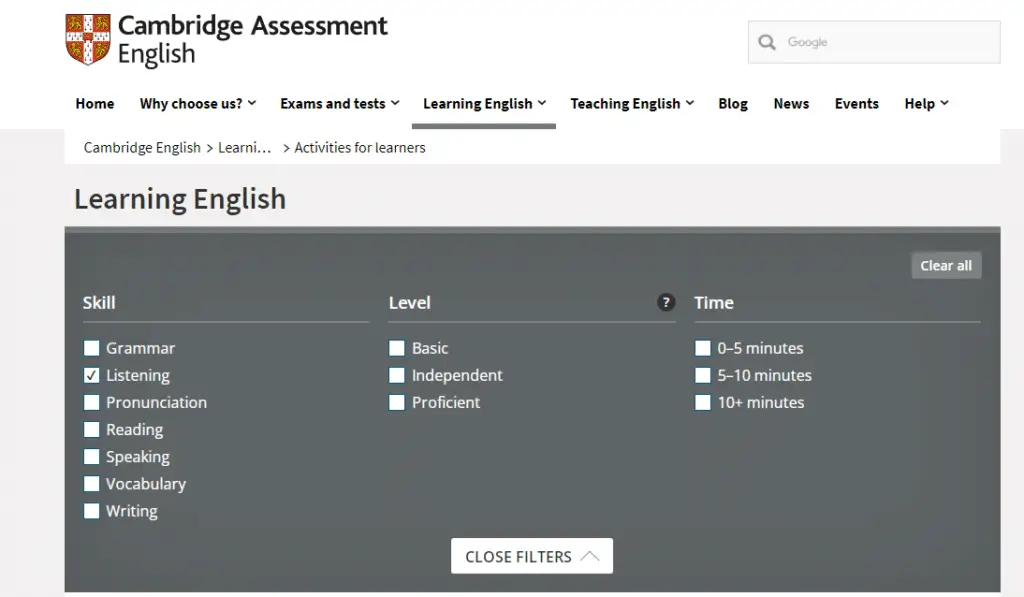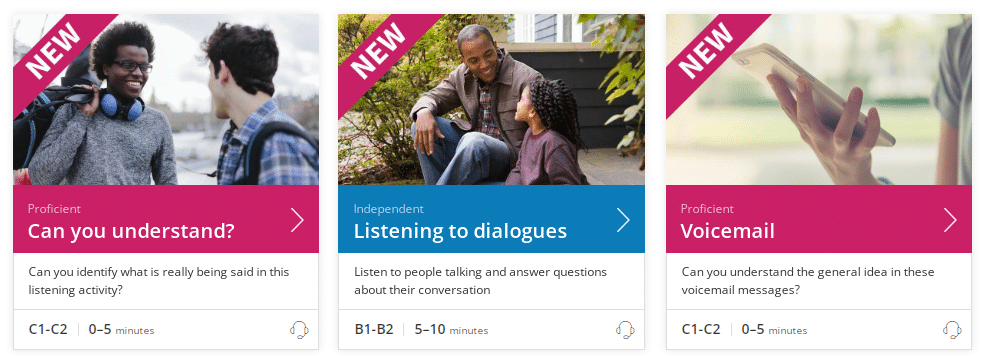It is a dream for all English learners to speak like native English speakers or have a native accent. Is it an achievable goal? Well, the honest answer is No.
However, there are several techniques to improve your English speaking skills, boost your oral fluency, and in the end, you will sound more proficient or even native-like.
This article shares the many proven tips and ideas you can use to speak English without an accent.
What Does It Mean to Be Fluent?
Or What does it mean to speak English well?
Oral fluency means your ability to speak English naturally and effortlessly.
If you speak without hesitation – or if the uncertainty is content-related and doesn’t mean that you have poor vocab – with a logical flow of thoughts and appropriate vocabulary and grammar, then congratulations!
You’re a proficient English learner. Above all, your pronunciation should be correct.
Of course, there are degrees of oral proficiency, but these are the basic requirements.
5 Best Ways to Start Improving Your English Accent
Ideally, as an English learner, you are not expected to have a native accent. However, there are several ways to improve your accent and the way you speak. I know you may ask yourself this question now.
How can I improve my speaking skills? And How can I improve my English accent?
The secret is mastering English pronunciation. Pronunciation is a very important speaking sub-skill.
The more skillful you are in English pronunciation, the more fluent and proficient you will be. You need first of all to know the prominent features of the English language pronunciation.
You can start with individual sounds, then move to stress, rhythm, intonation, and more complicated layers of pronunciation.
1. Start With Individual Sounds
Each language has distinctive sounds, and English may have unique sounds that don’t exist in your native or mother tongue. If you mispronounce some of these sounds, it will be why your speech has a foreign accent.
First of all, it’s crucial to differentiate between letters and their sounds. The letters representing vowels are a,e, i,o,u.
English vowels can be categorized as short vowels, long vowels, and diphthongs. Diphthongs are the combination of two vowel sounds.
a. Short vowels
| /a,(æ)/ | cat, ant |
| /e,(e)/ | get, egg |
| /i,(I)/ | pin, win |
| /o,(ɒ)/ | dog, block |
| /u,(ʌ)/ | up, bus |
| (ǝ or schwa) | about, water |
b. Long Vowels
| /i:/ | as in | bee, speak |
| /u:/ | as in | moon, crew |
| /ɜ:/ | as in | heard, third |
| /ɔ:/ | as in | taught, port |
| /ɑ:/ | as in | bar, farm |
c. Diphthongs
| /aʊ/ | as in | out, town | |
| /aɪ/ | as in | eye, fight | |
| /eɪ/ | as in | pray, day | |
| /eə/ | as in | rare, air | |
| /ɪə/ | as in | deer, ear | |
| /oʊ/ | as in | go, slow | |
| /ɔɪ/ | as in | boy, coin | |
| /ʊə/ | as in | tour, pure |
Notice that the pronunciation of vowels is different from one accent to another.
For instance, American English is different from British English in pronouncing some words because they pronounce vowels differently. For instance, the word “dog“ is pronounced as /dɒɡ/ in British English and /dɑːɡ/ in American English.
More listening exercises would raise your self-awareness, and you will be able to spot the difference.
Work hard to differentiate between vowel sounds. Mispronouncing vowels changes the word’s meaning.
d. Nasal sounds
There are several consonants in English, and the nasal sounds are /m/, /n/, and /ŋ/.
| /ŋ/ | as in | wing, gang, and king |
2. Stress the Right Syllable in English Words
Stressing the right syllable in the word is crucial for conveying the proper meaning and showcasing your proficiency skills.
| ICE cream | Vs. | I SCREAM | |
| REcord | Vs. | reCORD |
Remember that placing the stress in the right syllable helps you speak clearly and pronounce English words correctly.
- Remember to divide the word into smaller syllables.
- Then, place the stress in the right syllable.
- Remember that the stressed syllable is stronger, louder, and higher.
There are several rules of syllable stress; we touch upon the basics. Stay tuned to know more in our blog!
3. Stress the Right Word in A Sentence
It is a very common mistake among English learners, emphasizing even the upper-intermediate ones. They stress every word in the sentence, and this is wrong!
In English, you should put more emphasis on content words rather than functional words. That’s why you may have the feeling that native English speakers speak too fast. Stressing the right content words will improve your speaking skills and your accents tremendously!
Stressing all words in a sentence makes your speaking awkward, and it is another reason to have a foreign accent when you talk.
You may ask now what is content words and functional words?
- Content words are the words that carry the meanings like nouns, verbs, adverbs, and adjectives.
- Functional words are words that have grammatical functions like prepositions and articles.
If you emphasize a specific word, it means that you want to highlight a particular meaning.
| Maria returned from Barcelona. | Maria, not any other person. |
| Maria returned from Barcelona. | Returned not traveled to. |
| Maria returned from Barcelona. | Barcelona, not any other place. |
4. Connected Speech
Again, English is not pronounced as a separate set of words. Instead, English sounds are connected. For instance,
Pick and go is pronounced as pick n go.
Elision and assimilation are the most common types of connected speech.
Elision means deleting a sound. For instance, “I used to” is pronounced as “useto”
Assimilation means when joining sounds together, you will find extra sounds appear. For instance, when you pronounce “last year” you the t becomes /tʃ/. ˈlɑːʃ tʃɪə
5. Intonation and Melody of Speech
English is a musical language. When we speak, our voice goes up and down. In other words, there is a degree of highness and lowness of our tone when we talk. This variation is called intonation.
Some learners may follow the intonation of their native language when they speak English. It’s another reason for sounding awkward or having a foreign accent when you speak English.
The English language usually follows specific intonation patterns.
Falling intonation (➘)
- Statements: He completed her project ahead of schedule..
- ➘ Wh questions: How did he finish so quickly? ➘
- Statements: He bought a new car last week.
- ➘ Wh questions: When did he purchase the new car? ➘
Rising intonation (➚)
- yes/no questions: Did you call me? ➚
- Question tags that mean uncertainty: You like coffee. Don’t you? ➚
Learn how to speak using the right:
- Pitch
- Loudness
- Length of Sound
- Rhythm
Listening helps you to identify and raise self-awareness of pitch, rhythm, and intonation.
If you want to speak English well, you should include and integrate listening into your plan. There are countless listening resources. Here are some reliable sources. You can also listen to podcasts, audiobooks, or even to your favorite celebrity like Andrew Tate, for instance.



Listening Tips:
- Try to listen to observe the rising and falling intonation, syllable stress, or content word stress.
- You may not observe everything from the first time. Feel free to repeat.
- Try to have just one or two listening objectives to stay focused.
11 Ideas to Practice and Refine Your English Accent
Now, you’re familiar with the prominent features of English language pronunciation. You’re more aware of individual English sounds and what makes your accent sounds awkward.
The reasons are mainly because of mispronouncing some sounds, placing the stress on the wrong syllables, and making some pitch, rhythm, and intonation mistakes.
It’s time now to provide you with some practical and highly recommended tips to improve your speaking skills.
1. Try Speech Shadowing
Shadowing is an excellent exercise to train your places of articulation to pronounce English.
Shadowing helps you to mimic English sounds, intonation, and rhythm. It allows you to be more fluent and makes your mind and your throat ready to speak English!
How to do it? Listen to a speaker in English and repeat what you hear. Listen to a speech, for instance, and repeat it.
2. Enunciate Your Words
To enunciate is to speak English. You may notice that some native speakers speak too fast.
However, for English learners, speaking too fast may result in not being clear enough. Or the listener may not catch what you want to say.
Enunciation gives you the chance to practice word stress, sentence stress, intonation, pitch, and rhythm.
3. Perfect Your Pronunciation of “th”
“Th” is a distinctive sound in English. Learning how to pronounce it correctly gives you extra credit. You may not have these sounds in your mother language.
The correct pronunciation of the “th” sound depends on the tip of your tongue and the air coming from your throat.
| Voiceless “th” sound θ | Thank you. Three. Thunder. Thousands. Theme. Teeth. |
| Voiced ‘th“ sound ð | Brother. Mother. Father. That. The. There. |
4. Speak Slowly
Again, enunciate your words and make yourself clear. The most important part of speaking is your ability to communicate and make yourself understood.
Speaking at a slower pace would enable you to perfect your English pronunciation with the proper intonation, pitch, and rhythm.
In addition, mastering all aspects of pronunciation needs a lot of practice to be done automatically. So, slow down!
5. Read aloud
Reading aloud creates a connection between what’s written and what’s spoken.
It’s an excellent exercise to put what you learn into practice. It helps you to have self-assessment as well. When you read aloud, you will notice your progress or the areas in your pronunciation that need improvement.
6. Make Mistakes
Yes, you read it correctly! Make mistakes because mistakes are an integral part of learning. Any new skills you acquire need time to master.
You may find some features of the English language pronunciation more challenging. Or they don’t exist in your mother language. Therefore, they may need more training and extra effort.
You need to know that we learn differently. You may find someone else understands faster than you and vice versa.
Accept criticism and feedback to correct your errors because it’s natural to make mistakes in anything new you learn, not only learning languages.
Give yourself enough time to learn and of course, don’t forget to celebrate your success!
7. Celebrate Your Success
Keep yourself motivated and celebrate your success.
Give yourself a treat or anything that would make you happy 🙂
8. Enroll in English Language Centers
Taking English classes gives you the chance to interact with other learners and practice more speaking time.
It allows you to learn from experienced instructors who can correct your mistakes.
You can look for a reliable center to enroll in the class you need, whether starting with general English or a conversation ( speaking-focused) class.
9. Practice Speaking Always
Practicing speaking is something like going to the gym. To move to the next level, you need to keep going.
If you don’t have a speaking partner, you can use Cambridge Speak and Improve.
It can assess your speaking skills through various questions. Try not to give short answers. It’s a chance to listen to yourself and observe what needs improvement.

10. Listen, Listen and Listen!
As mentioned earlier, listening increases your self-awareness of the most prominent features of the English language. You can listen to whatever you like.
If you’re too busy and can’t dedicate much time to learning, You can check the following websites.
You can still learn a lot of English in just 6 minutes or even one minute!
11. Be Persistent
Learning and mastering new skills need time. Be persistent. Give yourself enough time to be more skillful.
Try to have a consistent effort even if you dedicate a short period to learning. Make it consistent, and keep learning!
The Importance of Mastering English Neutral Accent
A neutral English accent means that your mother tongue’s influence is not strong. For instance, if your mother tongue is Spanish, people wouldn’t recognize a heavy Spanish accent in your English when you speak.
Three Common Accents
The most popular accents in English are the American, the British, and the Australian accents.
Each country also has variations of the English accents spoken. Some variations may include regional differences. For instance, people in the north speak slightly differently from people in the south and so forth. This variation
- American English is the accent in North America.
- British English is the accent in the U.K.
- Australian English is the accent in Australia.
The differences between the three accents are mainly in pronunciation, spelling, and vocabulary. For instance, British people drop the “r” sound at the end. American people say fall, not autumn.
It’s highly beneficial to include different English accents in your speaking practice.
Youglish is an excellent listening resource to listen to the English accent you want. You can type the word you want to listen to, then select which accent. You will find several original videos, and you can listen to the words in context. In addition, you can find the transcripts under the video so you can follow what you listen to.
For instance, I wrote the word “improve” in the search toolbar, and for this example, we chose the Australian accent. There are more than 2000 videos that contain the word improve. I watched one of these videos, and I followed the speaker through the transcript below. You can find the word “improve” highlighted as well.


Reduction of Your Accent
Having an accent is not a bad thing. Your accent represents the culture and heritage of where you came from.
Improve your English communication and by practicing speaking the English language as often as possible.
It will eventually reduce your accent in the long run.
The main goal here is the reduction of your accent rather than eliminating it.
In the end, magic happens but not overnight. Be persistent and follow the techniques in this article, and you will feel the progress you make one step at a time.
Keep an eye on our blog to know about the English language.

